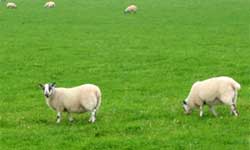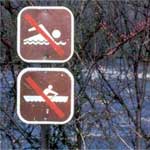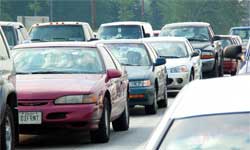Tragedy of the Commons
When doing what's good for you isn't good for you
Picture yourself in a rural setting with villages surrounded by grassland open to herdsmen to graze their animals. This "commons" is available to all without restriction.
Imagine that the common pasture is supporting the maximum number of sheep that it can. There is just enough grass to keep all the sheep well fed, but no more. Adding sheep would mean less food for each.
 However, for each herdsman it appears to be an advantage to increase the size of his herd. More sheep means more wool and more income. There is also a disadvantage in doing this: there will be slightly less food for each of his sheep. But this disadvantage appears small since it is spread among all the sheep, including those of the other herdsmen. So from the point of view of each herdsman, the gain is great and the loss is small.
However, for each herdsman it appears to be an advantage to increase the size of his herd. More sheep means more wool and more income. There is also a disadvantage in doing this: there will be slightly less food for each of his sheep. But this disadvantage appears small since it is spread among all the sheep, including those of the other herdsmen. So from the point of view of each herdsman, the gain is great and the loss is small.
The tragedy is that when all herdsmen act this way, the small losses add up to a disaster for everyone.
The Tragedy of the Traffic Jam
|
Photo courtesy of U.S. Census Bureau. |
A modern example of a "tragedy of the commons" is traffic jams in major cities. A public good gets overused and lessened in value for everyone. Each individual trying to get to work quickly uses the freeway because it is the fastest route. In the beginning, each additional person on the highway does not slow down traffic because there is enough "slack" in the system to absorb the extra users. At some critical level, however, each additional driver brings about a decrease in the average speed. Eventually, there are so many drivers that traffic crawls at a snail's pace. Each person seeking to minimize driving time has in fact conspired to guarantee a long drive for everyone.
Failing Fisheries
|
Photo courtesy of NOAA. |
We see this same pattern in fisheries around the world. The oceans are not owned by individual fishermen or controlled by countries. They provide a common resource of fish. As the number of fishing boats increases year after year, the total catch increases. Sounds good, right? However, as the total catch increases, it reduces the fish population's ability to restore itself.
Eventually the total individual and collective catch drops. This puts more financial pressure on fishermen to try to catch even more fish. Catching more fish only erodes the restoration capacity of the fish population even more. What would you do if you were a fishing boat captain faced with these issues? You can find out for yourself by playing the Fishing Game.
Waste in Our Waterways
|
Can you be a successful fisherman while preserving the common fishing grounds for everyone? Give it a try with the Fishing Game. |
 In some cases the problem is not one of taking too much from a common resource. Instead the problem is putting too much in. With a small population it is not a problem to dump waste into a river. Waterways cleanse themselves with time. As long as the load of waste is not too great, the river can maintain its clean state. But if there is too much waste the river becomes polluted. People can no longer drink the water. They may not even be able to safely swim or go boating in it.
In some cases the problem is not one of taking too much from a common resource. Instead the problem is putting too much in. With a small population it is not a problem to dump waste into a river. Waterways cleanse themselves with time. As long as the load of waste is not too great, the river can maintain its clean state. But if there is too much waste the river becomes polluted. People can no longer drink the water. They may not even be able to safely swim or go boating in it.
Greenhouse Gases
This is the way it is with the atmosphere. Carbon dioxide (CO2) is constantly going into the atmosphere and out of it in the carbon cycle. The oceans and forests absorb CO2. With industrialization, factories, cars, and power plants pump CO2 into the atmosphere faster than it can be absorbed. The commons is being overwhelmed.
Think of the Earth’s atmosphere as a tremendous bathtub. Imagine the concentration of greenhouse gases as the water in the bathtub. Water flows into the tub like CO2 goes into the atmosphere. Like the water running down the drain, CO2 is removed from the atmosphere. If the rate of flow from the faucet into the tub is equal to what is going down the drain, the water level remains the same. If you turn up the faucet, the level rises and the tub may overflow. Right now our atmospheric bathtub is filling twice as fast as it is draining.
What Can Be Done?
The term Tragedy of the Commons was coined by Garrett Hardin in an article he wrote in 1968. He says that problems that fall into this category have no technical solutions. They require changes in human attitudes and behavior.
In the case of climate change, the solutions are both behavioral and technical. We can use energy more efficiently, increase the use of alternative energy sources that do not produce CO2, and capture and store the CO2 that we do produce. So what’s the problem?
The problem is that individuals acting in their own interests feel immediate gain from their actions. But the losses from the impact of global warming are not felt immediately. So I may drive a large car because I feel more comfortable in it. The discomfort I will feel when sea levels rise or storms intensify may be decades away. And, I don’t see any immediate connection between my actions and those consequences. In fact, if I were the only one driving a big car, there would be no negative consequences. Like the herdsman who adds a sheep to his flock, the benefit is clear and immediate while the loss is diluted and delayed. But when many herdsmen act this way they all suffer.
A solution requires people to collectively make a decision to alter the behavior of everyone, including themselves. One way to do this is to cause climate-friendly actions to have immediate positive results. For example, in the Sleipner gas field in the North Sea, the tax policy of the Norwegian government makes it economically advantageous to capture and store CO2 rather than release it into the atmosphere. The mechanism is simple: there is a tax on CO2 that is released. Sure, it costs money to capture and store CO2. But in this situation it costs more not to.
This content has been re-published with permission from SEED. Copyright © 2025 Schlumberger Excellence in Education Development (SEED), Inc.




